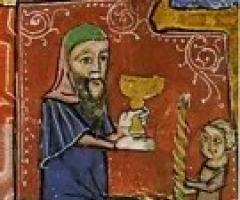Why can't Jews work on Saturday? When Jews are not allowed to work A Jewish holiday when they are not allowed to do anything
Theme "parasitism" Haredi is of deep and ongoing concern in Israel, so let's try to sort out your concerns in order.
If everyone studies, who will work then?
The Jewish “distortion” was described a long time ago by King David in his Psalms (27:4): “... if only I could dwell in the house of G-d all the days of my life...”. The Jewish ideal is to dedicate one's life to Torah study, personal improvement, and spiritual life.
Apparently, having heard this, you felt a strong fear: what will happen if the Jewish people, all as one, rush to fulfill this dream, then who will work?!
Firstly, you shouldn’t start getting nervous now, since, unfortunately, such a trend is not yet noticeable among the people.
Secondly, even if we assume that this will happen, you should not be afraid either, because these will be the days of the coming of Moshiach, and then everything in the world will change, including the need for work.
And why " Haredi» completely don’t work?
You apparently mean that all the other residents of Israel “all” work, and only “these” “shirk”? Ask the Israeli Bureau of Statistics, they know how everyone works. But you can see with your own eyes how Haredim “evade” in any religious area. Religious people work there in all areas. Therefore, “no one is working” is better corrected to “partially...”.
First of all, these are students yeshivas. True, there should be fewer complaints against them. After all, just as students are not expected to go out to work while they are studying, so are students yeshivas one should not expect them to join the ranks of the working people.
And the main “parasites” are students kolleles, that is, married Jews who, instead of working, continued their studies. And although there are not many of them and their wives work (and there is no rule anywhere that both spouses must work), this is enough to cause a wide variety of feelings in people. Those who are older are annoyed, “they would like to kill everyone”, those who are younger are regretful, “how many programmers are disappearing”... That’s mainly about them, the students kolleles, we will talk about it.
Why is work a sin?
If you already reminded us about sins, then I will note that the need for work, as a means of achieving food, really appeared in the world precisely because of sin. The First Man was not created for physical work, but when he sinned, he was punished: “By the sweat of your brow you will eat bread...” Bereshit(3:19). That is, before sin, Adam ate bread without sweat, without effort and work, but after sin, a reality emerged that forced a person to constantly work in order to survive. This is not a blessing, but a curse. Therefore, the words “slave” and “work” have the same root. And although many believe that Man was created to be a slave to work, initially this was not the purpose of his Creation, but to achieve spiritual perfection.
It is important to note that there, at the end of history, having corrected original sin, humanity will again come to a state where there is no longer a need to work.
The debate of the wise men about the need to work...
So, initially man was not created for work; he has a different purpose for appearing in the world. Therefore, Jewish thought not only does not see work as an end in itself, but even questions it as a means of subsistence. And the debate on this topic has existed since ancient times. In the treatise Berachot(35, b) there is a famous polemic between Rabbi Ishmael and Rabbi Shimon bar Yochai, he is abbreviated as RASHBI. Rabbi Ishmael argued that a Jew must learn Torah, but he also needs to work to provide food for himself and his family. RUSHBI argued the opposite: there is no need to work. After all, if a Jew wastes time on work, he will not achieve the goal of his creation and will not comprehend the full depth of the Torah. How will he live? G‑d will take care of him and send food through someone. This debate is summed up by the sage Abae: “...many followed the path of Rabbi Ishmael and it worked out for them, but those who chose the path of RASHBI did not work out.”
Commentators of the Talmud explain this dispute as follows. Abai's opinion does not favor Rabbi Ishmael; both opinions are true and fair. Both believe that it is necessary to study, but Rabbi Ishmael believed that it is additionally necessary to work in order to provide oneself with food. This opinion is considered as a general rule, as the path for the masses, for the entire people. And RUSHBI pointed out an exception to the rules, an individual approach, a path for the few. The chosen ones not only can, but also must live a full spiritual life without working, just like Rabbi Shimon bar Yochai himself, the author of the Zohar.
So, the path acceptable to the majority is the path of combining work and study.
Why should everyone study?
“Well, that’s exactly what I had in mind,” you will be delighted, “send a few excellent students to study at yeshiva, and send the rest to work!”
Unfortunately, I must disappoint you, there are several reasons why the Jewish world has rejected such a social model in our time.
Changing reality
Indeed, since ancient times, Jews in general worked and studied, and a few devoted their entire lives to studying the Torah and serving G‑d. But a lot of time has passed since then, and the world has changed. Previously, Jewish children from an early age went to get some kind of profession, and this in no way prevented them from remaining deeply religious and fulfilling the commandments of the Creator, since the entire environment was imbued with this. In our generation this is not at all the case...
Nowadays, the Jewish street is less and less Jewish. And it has become non-Jewish to such an extent that if a guy does not study in a yeshiva - not that he will have a gap in Jewish education, it is unlikely that he will remain a Jew, devoted to the Torah, and it is even unclear whether his grandchildren will remain Jews at all.
According to one of the greatest sages of our time, Rav Yakov Yisroel Kanevsky (Stipler), our time is like “ gzeratshmad“—that is, an attempt to destroy the Jewish people, so the presence of Jewish children and youth in yeshivas is a matter of spiritual life and death. This is the reason why all our children are sent “to the head” to receive a Jewish education and upbringing.
But when it is received, when the young men are formed as individuals and create families, only then will each of them be able to decide for himself which path to choose. Either the path of Rabbi Ishmael - and then they will go to learn some profession and look for work (while strictly observing all Jewish laws and studying in their free time), or they will choose the path of the chosen ones, following the path of RASHI, and devote their entire lives to the Torah and spirituality.
And as long as they do not have this maturity, they must learn all the basics of Judaism, which can only be obtained in a yeshiva or in collele. And there is no doubt that if they are not educated in this way, they will not only not follow the path of RASBI, but they will not even reach the path of Rabbi Ishmael. Their Jewishness will be without deep, strong roots, and the very first breath of wind will blow the kippah off their heads.
Continuation of the Jewish relay race
Another reason why everyone “universally” studies in yeshivas is related to the need for each generation to grow up those few sages who will be able to rise to the pinnacle of spiritual life and through whom the entire Torah will pass to the next generation.
And long ago it was noticed that if a thousand begin their studies, then... only one of them will become a Rabbi. That is, in order for the few to appear, it is necessary to train the many. And there is no way to predict who will ultimately be among these units. No psychometric exam will help. The Torah is not like the rest of the knowledge in the world. It is given not to the talented, but to those who are ready to devote themselves wholeheartedly to study and work on themselves. Often, great rabbis became those who in childhood, and sometimes even in adolescence, did not shine with special talents, but they were pure and full of desire to know. Therefore, it is necessary that all Jewish boys, without exception, learn Torah, so that all have a chance to become great in the generation and from them will emerge those few who will continue the baton of Jewry for all generations.
Spiritual bar
And there is one more reason. We initially set a high goal for our children to be among the chosen ones, to be Jewish sages. And the reasons for this are simple and obvious. After all, the one who will study, but, alas, will not succeed in his studies, will be able to live as a Jew who works, fears God and establishes consistency in the study of the Torah. But if we initially lower the bar and set him on the path to employment, then he will certainly never emerge as a sage. Therefore, we desire, bless and demand the best from our children. After all, without a passionate desire to achieve the maximum, the minimum will not be achieved.
And at the same time, when the “numerous” follow the path of the Torah, they will at least feel the desire to be like those “few”, and even if they do not deserve to be among the selected army, they will be able to help those who hold everything Jewish on themselves, to appreciate those , who preserves the Jewish people and passes on the entire heritage. That is, their path is not an ideal, but a temporary and forced occupation.
And the ideal of a Jew will always remain the words of King David: “...I wish I could dwell in the house of G-d all the days of my life...”
Share this page with your friends and family:
In contact with
On almost every excursion in Jerusalem I am asked: “Tanya, what is Shabbat?” Sometimes they offer their own options, which are very erroneous. Sometimes they even draw an analogy with the Sabbath. Therefore, I decided to write on this topic for those who are planning to come to Israel.
Shabbat is the seventh day of the week, which is essentially a holiday for Jews. Already the day before Shabbat, Jews begin to wish each other “Shabbat Shalom,” that is, “peaceful Saturday” or “hello Saturday.” The main rule of Saturday (Shabbat) is that a person should not work. Isn't it a wonderful condition? But everything is not so simple, because the Jews call work on Shabbat something that you may not associate with it at all. For example, writing (although you can read, but religious literature), or hanging laundry, or turning on/off the light, you can’t even tie your shoelaces. It's easier to say what can be done. But what is possible is quite enough for a Jew, since you need to devote this day to God and family. You might think that it’s impossible to spend the day with family if you can’t properly cook a meal and take the kids to an amusement park? But it turns out that what is much more important for a family is love, communication and attention. And there are all conditions for this on Shabbat.
Jews celebrate Shabbat with a Shabbat meal. The woman lights candles, the husband reads the blessing for Shabbat, Shabbat wine (similar to Cahors) or grape juice is poured, and challah, a special bread for Shabbat, is broken. The whole family sits around the table and celebrates Shabbat - they communicate, eat, sing songs. Shabbat begins at sunset on Friday and ends on Saturday, also at sunset. For a traditional Jew, Shabbat is a Holy Day, so it is not only celebrated, but also seen off. The ceremony is called "Havdalah" from the word "to separate" - you need to separate the holy day from everyday life. 
Shabbat for a Jew is one of the ten main commandments received by Moses on Mount Sinai (we read the Bible), which must be followed. In Israel the tradition is very strong and many Jews observe the Sabbath.
Shabbat has a powerful philosophical, spiritual background. There are many interpretations of the meaning of Shabbat. But the basics are as follows:
The Bible says that the Lord created all things in 6 days, and on the seventh day he rested from the creation process. "And God finished his work which he had done on the seventh day, and rested ( Shabbat) on the seventh day from all His works that He did. And God blessed the seventh day and sanctified it, for on it He rested from all His works, which God had created and created."(Gen.)
So he bequeathed to the Jews: " Say to the children of Israel, “You shall keep My Sabbaths, for this is a sign between Me and you throughout your generations, that you may know that I am the Lord who sanctifies you; and keep the Sabbath, for it is holy to you: whoever defiles it shall be put to death; whoever begins to do business in it, that soul must be destroyed from among his people; Six days let them do their work, and on the seventh a Sabbath of rest, dedicated to the Lord."(Ex.)
To this day, Jews try to observe the Holy Sabbath to the best of their ability and desire. This means that a tourist arriving in Israel and, for example, wanting to go on an excursion in Jerusalem with or without a Jerusalem guide, must take into account several points.
1. Already on Friday, towards evening, most establishments in the city begin to close: shops, restaurants, many museums. They will open either at the end of Saturday (in the evening) or the next day (Sunday).
2. Public transport does not work on Shabbat, so you need to take this into account when planning your day. If you are not staying in Jerusalem and want to come on a tour of Jerusalem on Friday, then plan the first half of the day to catch the last bus before the start of Shabbat or come by your own transport (optionally, on a tour transfer). If you have an excursion planned in Jerusalem on Saturday, count either on a taxi, or book an excursion with transfer (convenient, not cheap), or rent a car the day before and arrive in it.
3. Shabbat elevator. It’s very funny to listen to perplexed tourists who, without knowing it, used such an elevator. The fact is that in order not to press the elevator button on Shabbat (not to break the commandment - not to work and not to light a fire), elevators were created that move independently on Shabbat, constantly stopping on each floor. There are such elevators in many Israeli hotels, and tourists sometimes begin to panic when they get into them. So: don’t panic - the elevator will take you to the desired floor, but it will take longer than usual. By the way, as a rule, the hotel also has a regular elevator, for tourists - not Jews.
4. And, of course, if you are lucky enough to go on an excursion to Jerusalem on Friday or Saturday, then be sure to visit the Western Wall (Western Wall). You will get a special, unforgettable experience if you are there on the eve of Shabbat, between 4 and 6 pm on Friday.
Jews have a weekly holiday that is celebrated every Friday at sunset. It is called “Shabbat Shalom”, which means “Hello Saturday”. Every Jew reveres the sixth day of the week, which reminds him of his spiritual purpose in life. Let's find out Shabbat - what kind of holiday it is and how it is celebrated in Israel.
Shabbat – the seventh day of creation
According to the Pentateuch, the Sabbath was given by God at the end of the sixth day when man was created:
“And God finished on the seventh day His works which He had done, and He rested (Sabbath) on the seventh day from all His works which He had done. And God blessed the seventh day and sanctified it, for on it He rested from all His works, which God had created and created (Gen. 2:2-3).”
Previously, God blessed the fish, animals and birds he created (Gen. 1:22), then man and the Sabbath. In addition, according to the Torah, he sanctified the Sabbath. This is the only example in Scripture of something being blessed and sanctified at the same time.
Shabbat - the union of the Jewish people with God
According to the Pentateuch, the Sabbath is a sign between God and Israel:
“This is a sign between Me and the children of Israel forever, because in six days the Lord created heaven and earth, and on the seventh day He rested and was refreshed (Exodus 31:17).”
The Sabbath is a sign of the covenant (that is, a symbol of the union) between God and the people of Israel. It is said in the Torah: “You shall keep My Sabbaths, for this is a sign between Me and you throughout your generations; that you may know that I am the Lord who sanctifies you” (Ex. 31:13). It is said in the Sabbath prayers: “And You did not give the Sabbath to the nations of the world, nor did You give it to the idolaters, but only to Israel, Your people whom You chose.”
How did keeping the laws of the Sabbath help preserve the Jewish people?

The famous Kabbalist Yehuda Alevi (author of Kuzari) said that, thanks to the laws of the Sabbath, the Jewish people were able to survive through many centuries of exile and persecution. He explained that when a person is saturated with the light of the Sabbath, even in the most difficult circumstances, faith in God does not leave him. The Sabbath reminds every Jew of his specialness, because the observance of its rituals distinguishes this people from others.
Saturday is a family holiday. It strengthens relationships between spouses, children and the older generation. On this day, the whole family gathers at the festive table, sings songs, and goes to the synagogue. A space arises when a person can take a break from the hustle and bustle of everyday life and think about his purpose.
Shabbat in a Jewish home
A God-fearing Jew does not travel anywhere on the Sabbath, does not cook food, does not use electrical appliances, does not spend money, does not smoke or write. On this day he is indifferent to the achievements of technology. The radio is silent, the TV screen has gone dark.
Sports games, circus, theatrical performances, highways are not for him.
On the eve of the holiday

Each nation has its own unique characteristics and customs that distinguish it from others. Jews are one of the most distinctive peoples on Earth, having an ancient and tragic history and at the same time a national character full of love of life and strength. These features are reflected in the mentality and traditions that no one else has.
Celebrating Saturday
Only Jews, as well as related Karaites and Samaritans, celebrate Shabbat - in Russian - “Saturday”. This is due to the fact that according to the Bible, God gave the Sabbath to all creation as a time of rest at the end of the sixth day of Creation, after man was created. Shabbat is a sign between the Creator and the people of Israel. The Sabbath prayers say: “And You did not give the Sabbath to the nations of the world, nor did You give it to the idolaters, but only to Israel, Your people whom You chose.” Orthodox Jews celebrate Shabbat on Friday evenings with the lighting of special Shabbat candles and blessings. Shabbat ends on Saturday evening. All this time the Jews remain at peace, without doing any work. You can't even light a fire!
They have a habit of answering a question with a question.
In reality, of course, not all Jews always do this. However, the idea that Jews answer questions with questions is based on the traditional Jewish educational system. Jewish children and teenagers in cheder (traditional theological school) are taught not only to read sacred texts in Hebrew and Aramaic, but also to analyze the text and pose questions to it. The ability to pose questions, and therefore find answers to them, is one of the reasons why we consider Jews very smart.
Selflessly care for their family
Of course, all people in the world care about their family to one degree or another - Jews are not alone here - but it is among Jews that fathers care for their children as touchingly and selflessly as mothers. Husbands dissolve in their wives, and the image of the “Jewish mother” has practically become a symbol of all-consuming care. For many reasons, primarily because the Jewish people lived for centuries without a homeland, surrounded by other, seemingly hostile nations, the Jews developed the habit of living in close-knit family clans, caring for each other and supporting each other. Because who else will take care of the poor Jews if not themselves?
Do not drink milk after eating meat
Jews have one of the most complex systems of food prohibitions. Everyone knows that they, like Muslims, are forbidden to eat pork. But that's where the similarities end. Kosher (permissible) meat for Jews is only the meat of cow, goat and sheep, as well as elk, gazelle and mountain goat. The only birds you can eat are domestic ones, such as chickens, geese, ducks, quails, and turkeys. You can only eat an animal that has been slaughtered by a religious carver who has a special permit for the slaughter of animals. The animal must die instantly, all blood from the carcass must be released in accordance with the rules. Only kosher wine is allowed, that is, made by a religious winemaker. And finally, mixing milk and meat is strictly prohibited, not only in the process of preparing food, but also in the human stomach. Drinking milk is allowed only 6 hours after eating meat.
Stones are brought instead of flowers
It is not customary for Jews to bring flowers to graves. Instead, they place a pebble on the gravestone. This is due to the fact that, according to Jewish tradition, the stone symbolizes eternity. Therefore, at all Holocaust memorials, we almost never see flowers, but we will find a scattering of stones.
Spinning a rooster over your head as a sign of repentance
On the eve of Yom Kippur, Orthodox Jews perform a strange, in our opinion, ritual: they spin a rooster over their heads (for women, a chicken). This custom is called “kapparot” - purification, atonement. In this way, Jews remind themselves that punishment awaits them for their sins and that they need to repent. Holding the bird in his right hand, the Jew reads the sacred text, then spins the chicken or rooster around his head, and says: “This is my replacement, this is in my place, this is my ransom! This rooster (chicken) will go to the sacrifice.” Some people take fish (necessarily kosher) or just money instead of chicken. Chicken or fish, or money - everything should be given to the poor after the ceremony.
They give alms - wearing masks
During the celebration of Purim (one of the most joyful Jewish holidays associated with the memory of the deliverance of the Jewish people from danger in the 4th century BC), it is customary to distribute sweets and other treats, as well as alms to those in need. Usually, this is entrusted to children, but sometimes adults also take on this important responsibility. At the same time, such gifts must be brought in masks. This is due to the fact that carnivals and costumed processions are generally very common on Purim, as well as the fact that according to Jewish custom, the one who is given alms does not know who exactly did it. That's why benefactors hide behind disguises.
That's how lucky the Jews are - we have a holiday every week! Yes, Holy Saturday is not just a day off, but a real holiday. Of course, Shabbat is very different from other Jewish important dates.
Firstly, it happens not once a year, but much more often. Secondly, it is not associated with any specific historical event. Although... it depends on how you look at it. After all, we celebrate Shabbat in memory of the main event of human history.
God created the world in six days. And only on the seventh I decided that I deserved a break. “Took a break” or “stopped” - this is how the word “Shabbat” is translated. And since Jews believe that the creation of the world began on Sunday, it turns out that the seventh day is the day of stopping, respite - this is Saturday.
Among the commandments that the Almighty gave to Moses on Mount Sinai was the commandment to keep the Sabbath. What does this mean?
The most important thing is that you cannot work on Saturday. It's easy to remember and enjoyable to stick to. Saturday is a day off according to all laws, and doing nothing on this day is as easy as shelling pears.
But keeping this commandment only seems easy. On Saturday, God completed the creation of the world, so people are prohibited from any constructive or creative work. That is, the labor with which we create or change something.

There are several types of work that should be avoided during Shabbat. The first is cooking. But the Saturday holiday table is an important part of tradition! So Jewish housewives have to work in advance, on Thursday and Friday. On Saturday, food cannot even be heated. Unless, of course, you leave the stove on since Friday.
Another prohibited type of work is anything related to the manufacture of clothing. Not only sewing and knitting, but even tearing threads or cutting animals! In addition, you cannot write or build anything.
Well, okay, you already understand - you can’t work on Saturday. But what can and should be done on Saturday?
We need to turn to God. And in general, think about everything important, beautiful, deep - about what we usually don’t have time to think about on weekdays.
By the way, Shabbat begins on Friday evening - immediately after the sun sets. The holiday comes to the family, to every home. Mom lights Shabbat candles and reads a prayer. Then, when everyone sits down at the table, dad or grandfather says kiddush - blessing - over a glass of grape wine or juice. But no one starts eating yet: you still need to say a blessing over the bread. The bread on the table this day is not ordinary, but festive - wicker golden challah. When the wine and bread are blessed, you can dine.

During the Shabbat meal, people usually talk not about who got what grades at school, or about what’s going on with dad at work, or about who grandma had a fight with in the yard. If this is a religious family, dad can tell something interesting about the holy book - the Torah. But even if you and your family do not strictly observe Jewish customs, nothing stops you from singing. Yes, yes, right at the table! There are special Sabbath drinking songs that are very simple and cheerful. With them, peace and joy come to the house and soul.
On Friday evening and Saturday morning and afternoon, men come to the synagogue. The prayers said there during Shabbat are special. Not like on weekdays.
Shabbat ends on Saturday evening. A ceremony called Havdalah is held. This is translated as “separation” and means that we separate the Shabbat holiday and the work week that lies ahead of us. Everyone says “goodbye” to the Holy Saturday and returns to everyday worries.
For some, Shabbat is a truly sacred holiday. But even those Jews who do not follow all the traditions are happy to buy or bake challah, light candles, pour grape juice into glasses, remember the good things that happened during the week, and sing songs. And then Saturday comes!












